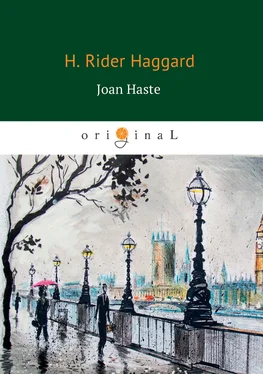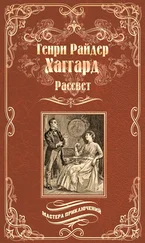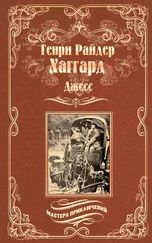Генри Райдер Хаггард - Joan Haste
Здесь есть возможность читать онлайн «Генри Райдер Хаггард - Joan Haste» — ознакомительный отрывок электронной книги совершенно бесплатно, а после прочтения отрывка купить полную версию. В некоторых случаях можно слушать аудио, скачать через торрент в формате fb2 и присутствует краткое содержание. Город: Москва, Год выпуска: 2018, ISBN: 2018, Жанр: Прочие приключения, Прочие приключения, на английском языке. Описание произведения, (предисловие) а так же отзывы посетителей доступны на портале библиотеки ЛибКат.
- Название:Joan Haste
- Автор:
- Жанр:
- Год:2018
- Город:Москва
- ISBN:978-5-521-06606-3
- Рейтинг книги:5 / 5. Голосов: 1
-
Избранное:Добавить в избранное
- Отзывы:
-
Ваша оценка:
- 100
- 1
- 2
- 3
- 4
- 5
Joan Haste: краткое содержание, описание и аннотация
Предлагаем к чтению аннотацию, описание, краткое содержание или предисловие (зависит от того, что написал сам автор книги «Joan Haste»). Если вы не нашли необходимую информацию о книге — напишите в комментариях, мы постараемся отыскать её.
Joan Haste — читать онлайн ознакомительный отрывок
Ниже представлен текст книги, разбитый по страницам. Система сохранения места последней прочитанной страницы, позволяет с удобством читать онлайн бесплатно книгу «Joan Haste», без необходимости каждый раз заново искать на чём Вы остановились. Поставьте закладку, и сможете в любой момент перейти на страницу, на которой закончили чтение.
Интервал:
Закладка:
Her aunt, indeed, was left to her, but from this relation she won no comfort. From many incidents trifling in themselves, but in the mass irresistible, Joan gathered that there had been little sympathy between her mother and Mrs. Gillingwater – if, in truth, their attitude was not one of mutual dislike. It would appear also that in her own case this want of affection was an hereditary quality, seeing that she found it difficult to regard her aunt with any feeling warmer than tolerance, and was in turn held in an open aversion, which to Joan’s mind, was scarcely mitigated by the very obvious pride Mrs. Gillingwater took in her beauty. In these circumstances Joan had often wondered why she was not dismissed to seek her fortune. More than once, when after some quarrel she sought leave to go, she found that there was no surer path to reconciliation than to proffer this request; and speeches of apology, which, as she knew well, were not due to any softening of Mrs. Gillingwater’s temper, or regret for hasty misbehaviour, were at once showered upon her.
To what, then, were they due? The question was one that Joan took some years to answer satisfactorily. Clearly not to love, and almost as clearly to no desire to retain her services, since, beyond attending to her own room, she did but little work in the way of ministering to the wants and comforts of the few customers of the Crown and Mitre, nor was she ever asked to interest herself in such duties.
Gradually a solution to the riddle forced itself onto Joan’s intelligence – namely, that in some mysterious way her aunt and uncle lived on her, not she on them. If this were not so, it certainly became difficult to understand how they did live, in view of the fact that Mr. Gillingwater steadily consumed the profits of the tap-room, if any, and that they had no other visible means of subsistence. Yet money never seemed to be wanting; and did Joan need a new dress, or any other luxury, it was given to her without demur. More, when some years since she had expressed a sudden and spontaneous desire for education; after a few days’ interval, which, it seemed to her, might well have been employed in reference to superior powers in the background, she was informed that arrangements had been made for her to be sent to a boarding school in the capital of the county. She went, to find that her fellow-pupils were for the most part the daughters of shopkeepers and large farmers, and that in consequence the establishment was looked down upon by the students of similar, but higher-class institutions in the same town, and by all who belonged to them. Joan being sensitive and ambitious, resented this state of affairs, though she had small enough right to do so, and on her return home informed her aunt that she wished to be taken away from that school and sent to another of a better sort. The request was received without surprise, and again there was a pause as though to allow of reference to others. Then she was told that if she did not like her school she could leave it, but that she was not to be educated above her station in life.
So Joan returned to the middle-class establishment, where she remained till she was over nineteen years of age. On the whole she was very happy there, for she felt that she was acquiring useful knowledge which she could not have obtained at home. Moreover, among her schoolfellows were certain girls, the daughters of poor clergymen and widows, ladies by birth, with whom she consorted instinctively, and who did not repel her advances.
At the age of nineteen she was informed suddenly that she must leave her school, though no hint of this determination had been previously conveyed to her. Indeed, but a day or two before her aunt had spoken of her return thither as if it were a settled thing. Pondering over this decision in much grief, Joan wondered why it had been arrived at, and more especially whether the visit that morning of her uncle’s landlord, Mr. Levinger, who came, she understood, to see about some repairs to the house, had anything to do with it. To Mr. Levinger himself she had scarcely spoken half a dozen times in her life, and yet it seemed to her that whenever they met he regarded her with the keenest interest. Also on this particular occasion Joan chanced to pass the bar-parlour where Mr. Levinger was closeted with her aunt, and to overhear his parting words, or rather the tag of them – which was “too much of a lady,” a remark that she could not help thinking had to do with herself. Seeing her go by, he stopped her, keeping her in conversation for some minutes, then abruptly turned upon his heel and left the house with the air of a man who is determined not to say too much.
Then it was that Joan’s life became insupportable to her. Accustomed as she had become to more refined associations, from which henceforth she was cut off, the Crown and Mitre, and most of those connected with it, grew hateful in her sight. In her disgust she racked her brain to find some means of escape, and could think of none other than the time-honoured expedient of “going as a governess.” This she asked leave to do, and the permission was accorded after the usual pause; but here again she was destined to meet with disappointment. Her surroundings and her attainments were too humble to admit of her finding a footing in that overcrowded profession. Moreover, as one lady whom she saw told her frankly, she was far too pretty for this walk of life. At length she did obtain a situation, however, a modest one enough, that of nursery governess to the children of the rector of Bradmouth, Mr. Biggen. This post she held for nine months, till Mr. Biggen, a kind-hearted and scholarly man, noting her beauty and intelligence, began to take more interest in her than pleased his wife – a state of affairs that resulted in Joan’s abrupt dismissal on the day previous to the beginning of this history.
To come to the last and greatest of her troubles: it will be obvious that such a woman would not lack for admirers. Joan had several, all of whom she disliked; but chiefly did she detest the most ardent and persistent of them, the favoured of her aunt, Mr. Samuel Rock. Samuel Rock was a Dissenter, and the best-to-do agriculturalist in the neighbourhood, farming some five hundred acres, most of them rich marsh-lands, of which three hundred or more were his own property inherited and acquired. Clearly, therefore, he was an excellent match for a girl in the position of Joan Haste, and when it is added that he had conceived a sincere admiration for her, and that to make her his wife was the principal desire of his life, it becomes evident that in the nature of things the sole object of hers ought to have been to meet his advances half- way. Unfortunately this was not the case. For reasons which to herself were good and valid, however insufficient they may have appeared to others, Joan would have nothing to do with Samuel Rock. It was to escape from him that she had fled this day to Ramborough Abbey, whither she fondly hoped he would not follow her. It was the thought of him that made life seem so hateful to her even in the golden afternoon; it was terror of him that caused her to search out every possible avenue of retreat from the neighbourhood of Bradmouth.
She might have spared herself the trouble, for even as she sighed and sought, a shadow fell upon her, and looking up she saw Samuel Rock standing before her, hat in hand and smiling his most obsequious smile.
Chapter 2
Samuel Rock Declares Himself
Mr. Samuel Rock was young-looking rather than young in years, of which he might have seen some thirty-five, and, on the whole, not uncomely in appearance. His build was slender for his height, his eyes were blue and somewhat shifty, his features sharp and regular except the chin, which was prominent, massive, and developed almost to deformity. Perhaps it was to hide this blemish that he wore a brown beard, very long, but thin and straggling. His greatest peculiarity, however, was his hands, which were shaped like those of a woman, were long, white notwithstanding their exposure to the weather, and adorned with almond-shaped nails that any lady might have envied. These hands were never still; moreover, there was something furtive and unpleasant about them, capable as they were of the strangest contortions. Mr. Rock’s garments suggested a compromise between the dress affected by Dissenters who are pillars of their local chapel and anxious to proclaim the fact, and those worn by the ordinary farmer, consisting as they did of a long-tailed black coat rather the worse for wear, a black felt wide-awake, and a pair of cord breeches and stout riding boots.
Читать дальшеИнтервал:
Закладка:
Похожие книги на «Joan Haste»
Представляем Вашему вниманию похожие книги на «Joan Haste» списком для выбора. Мы отобрали схожую по названию и смыслу литературу в надежде предоставить читателям больше вариантов отыскать новые, интересные, ещё непрочитанные произведения.
Обсуждение, отзывы о книге «Joan Haste» и просто собственные мнения читателей. Оставьте ваши комментарии, напишите, что Вы думаете о произведении, его смысле или главных героях. Укажите что конкретно понравилось, а что нет, и почему Вы так считаете.












